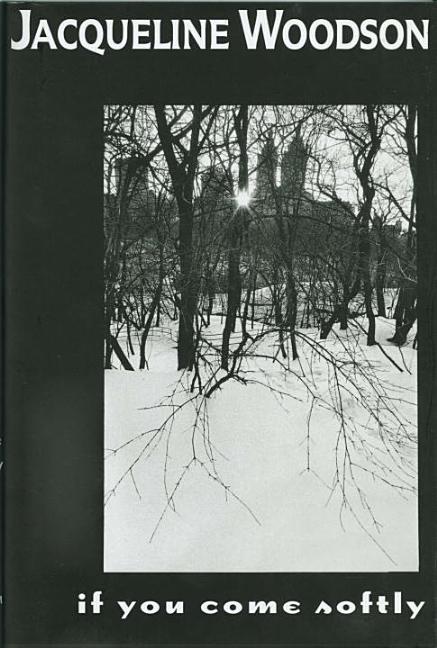Book Descriptions
for If You Come Softly by Jacqueline Woodson
From Cooperative Children's Book Center (CCBC)
A quiet, beautifully etched portrait of a first love that is shattered by the racism, If You Come Softly traces the relationship of two teens whose lives intertwine for a short but life-changing time. Ellie is Jewish and white. Jeremiah is black. Both are from well-to-do families where it's sometimes hard to be yourself, and both are new students at Percy Academy. It was Jeremiah's father, a well-known African American filmmaker, who wanted Jeremiah to attend a private school. Jeremiah doesn't let anyone know who is father is, though, or his mother, an accomplished novelist. It's too hard being yourself--being accepted for yourself, if your parents' fame precedes you. For Ellie, Percy was her own choice--made because she liked the sound of the name. "I knew it was a stupid reason to choose a school, but they all seemed exactly alike." Ellie lives with her parents in a large apartment that still echoes with the emptiness of her mother's leaving. It happened twice, and twice her mother returned, but the feeling of abandonment still haunts Ellie, even when she sits in the very same room as her mother harboring the secrets of her heart. One of those secrets is Jeremiah. They meet on the first day of school, and each makes the other feel right. But Ellie isn't sure how her parents would react to Jeremiah, and her heart can't risk finding out. For his part, Jeremiah takes Ellie home to meet his mother, who sees and understands her sons feelings. In his neighborhood, too, he has support, from a best friend whose mother is white and father is black. But he is hesitant to tell his father. "Thing about white people," his father tells him, "they don't know they're white. They know what everybody else is, but they don't know they're white." Jeremiah stays silent. Ultimately, however, it is not secrets and silence that separate Jeremiah and Ellie, it is the racism of our society, racism that makes a black teenage boy running with a basketball in a white neighborhood too quickly assumed as suspect, too quickly mistaken for a "tall, dark man" being pursued by the police. (Age 13 and older)
CCBC Choices 1998. © Cooperative Children's Book Center, Univ. of Wisconsin - Madison, 1998. Used with permission.
From the Publisher
A lyrical story of star-crossed love perfect for readers of The Hate U Give, by National Ambassador for Children’s Literature Jacqueline Woodson--now celebrating its twentieth anniversary, and including a new preface by the author
Jeremiah feels good inside his own skin. That is, when he's in his own Brooklyn neighborhood. But now he's going to be attending a fancy prep school in Manhattan, and black teenage boys don't exactly fit in there. So it's a surprise when he meets Ellie the first week of school. In one frozen moment their eyes lock, and after that they know they fit together--even though she's Jewish and he's black. Their worlds are so different, but to them that's not what matters. Too bad the rest of the world has to get in their way.
Jacqueline Woodson's work has been called “moving and resonant” (Wall Street Journal) and “gorgeous” (Vanity Fair). If You Come Softly is a powerful story of interracial love that leaves readers wondering "why" and "if only . . ."
Jeremiah feels good inside his own skin. That is, when he's in his own Brooklyn neighborhood. But now he's going to be attending a fancy prep school in Manhattan, and black teenage boys don't exactly fit in there. So it's a surprise when he meets Ellie the first week of school. In one frozen moment their eyes lock, and after that they know they fit together--even though she's Jewish and he's black. Their worlds are so different, but to them that's not what matters. Too bad the rest of the world has to get in their way.
Jacqueline Woodson's work has been called “moving and resonant” (Wall Street Journal) and “gorgeous” (Vanity Fair). If You Come Softly is a powerful story of interracial love that leaves readers wondering "why" and "if only . . ."
Publisher description retrieved from Google Books.


